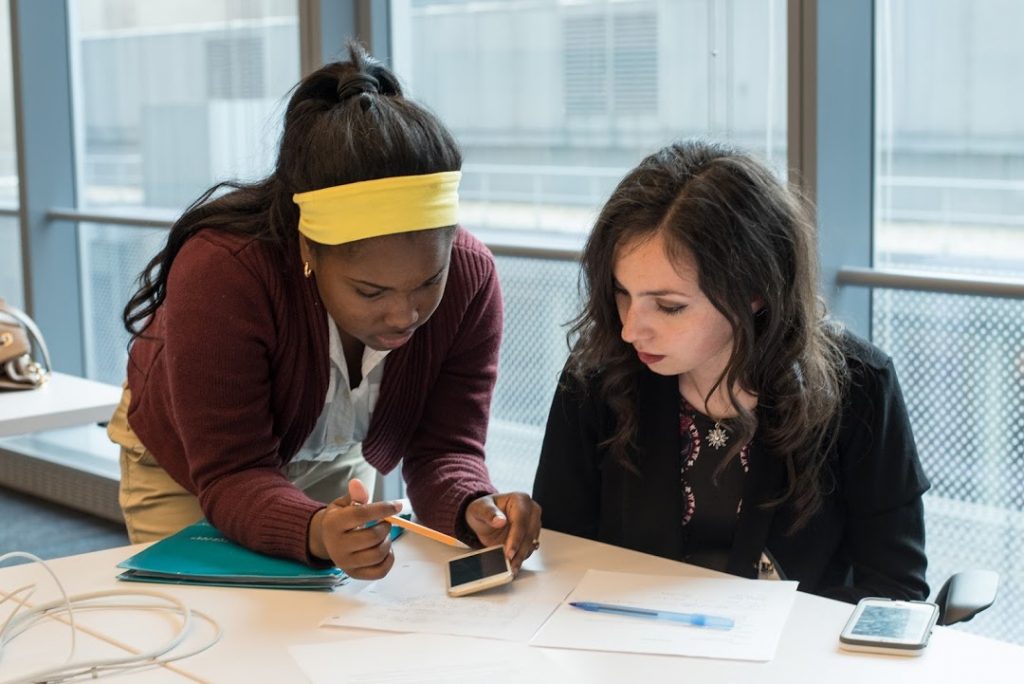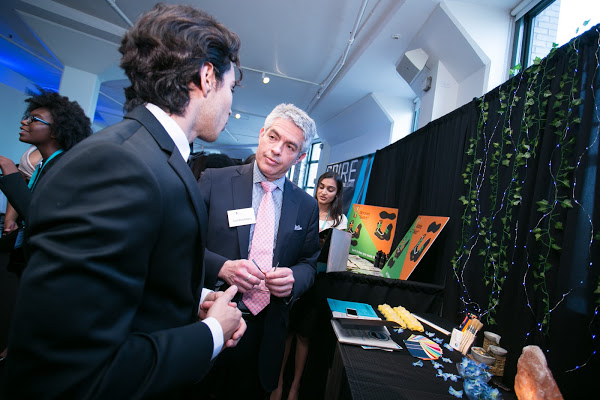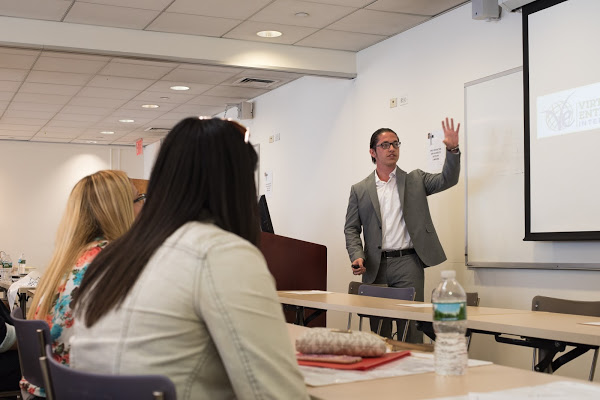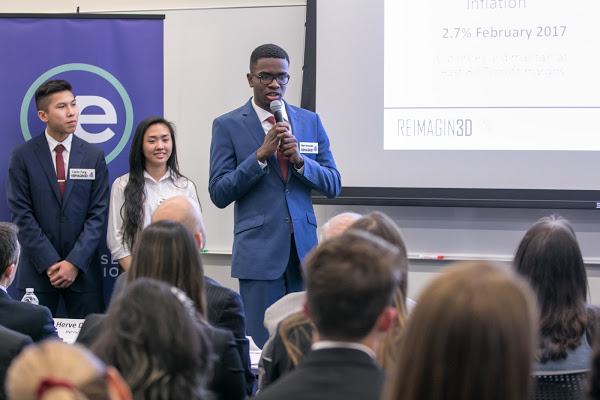When you attend your VE class, you’re walking into an office to become a young business professional. For students who are starting VE for the first time, the beginning of the school year marks the beginning of this transformation and for students who are returning for another year of VE, it marks a continuation.
On average, each VE student gains 180 hours of work experience during the course of the school year. Going through this program helps prepare you for success in college and careers and we want to make sure you get the most out of these 180 hours by sharing five essential questions for starting the year successfully.
1. How can you best manage your time?
2. How do you interact with businesses in your daily life?
3. What can you learn from former VE students?
4. How can you apply your talents, interests, and skills in VE?
5. What do you hope to accomplish by the end of the year?
1. How can you best manage your time?

People often say that “time is money” but time is, in fact, an even more limited resource, especially when your attention is split among the demands of school, friends, family, work, extracurriculars, sports, and the many other parts of life. Because of this, your first days in VE should include a focus on “How can I learn how to better manage my time?” and “How can I make the most use of my time?”
The tasks and projects you’ll work on in VE — from business plans to trade shows — will help you directly learn and develop your time management skills, so don’t worry if this is something you haven’t mastered yet. As a matter of fact, in 2016-17, 81% of VE students reported having developed time-management skills through the VE program. To get an idea of what to expect, take a look at the tasks and resources found within the Orientation section of the Hub. This will allow you to take a broad look at the events and activities you and your firm should be keeping up with, while giving you the opportunity to easily fit your VE tasks with the rest of your responsibilities.
Tasks & Resources:
- Orientation Task 1: Introduction to Virtual Enterprises
- Orientation Task 3: Understanding Time Management
Further Reading:
- Intuit QuickBooks: “Time Management Strategies to Help Take Control of Your Time“
2. How do you interact with businesses in your daily life?

Whether you realize it or not, you interact with businesses on a daily basis. While most of these interactions happen with you as a consumer, VE allows you to learn about business from the perspective of starting, managing, and working within a business.
Actively thinking about how you interact with businesses will help guide what kind of firm you want to start and what role you want to play within this firm. Which businesses are you loyal to? What businesses were involved in how you spend your free time? Which businesses are involved in what you wear and bring to class every day? Consider these questions with your classmates to help brainstorm your new VE business or improve your existing firm.
Tasks & Resources:
- Design Thinking
3. What can you learn from former VE students?

When you’re in VE, you’re participating in a program that has served over 100,000 students since its inception in 1996. This means students like you have gone through this transformation, facing the same challenges you’ll soon face and reaching the kind of heights you want to reach. Don’t be afraid to reach out to your school’s VE alumni as they are more than happy to help. Invite them into the classroom as mentors, show them what you’re working on, and ask them for advice. VE alumni have a first-hand understanding of how to make the most of the VE experience and are great role models.
“I am forever grateful for the opportunity to have been challenged in VE. I have a passion for mentoring students in these classes and sharing my experience to motivate them to achieve their best.” – Sally A., Class of 08, Moreno Valley HS, CA
In addition to actively working with VE alumni from your high school, you can also learn from the work they and students all around the country did by reviewing the top-rated elevator pitches, business plan presentations, video commercials, and other competition submissions from previous years. You can find many of these files on the Competition Results page, as well as the VE YouTube, Vimeo, Twitter, Facebook, and Instagram accounts.
Resources:
- Competition Results
- 2019 National Business Plan Competition Presentations
- 2018 National Business Plan Competition Presentations
- 2017 National Business Plan Competition Presentations
- 2016 National Business Plan Competition Presentations
4. How can you apply your talents, interests, and skills in VE?

Which classes have you found success in? What is your role in your club or your sports team? What do your friends and family go to you for help with? These questions along with VE’s Orientation tasks and resources can help you figure out how to match your strengths with potential jobs within the VE business. A core part of the VE experience is “Assuming the Role,” which is what you’ll be doing within a particular department (ex: Marketing, Accounting, Human Resources) and at a certain level (ex: Associate, Manager, Chief-level) to become a young business professional.
Tasks & Resources:
- Career Development Task 1: Matching Abilities and Skills with Job Traits
- Career Development Task 2: Applying for Job Positions in the VE
- Career Development Task 3: Interview and Placement Process
Further Reading:
- Truity: “The Big Five Personality Test“
- Psychology Today: “Big Five Personality Test“
- Harvard Business Review: “The New Science of Team Chemistry“
5. What do you hope to accomplish by the end of the year?

VEI presents Winning Women hosted by NBC Universal. (Photo: www.JeffreyHolmes.com)
Fresh into the VE year, it may be hard to imagine where or who you’ll be by the end of the year. However, take a moment and think about the skills you want to develop, the connections you want to make, and the project(s) you want to champion. As you go through the year, VE’s tasks, activities, and events will hone your leadership, professional, functional, and core technology skills as measured by the Career Readiness Framework.
Before you know it, you’ll be squeezing everything you’ve done and learned on a résumé and in a portfolio, connecting with fellow VE students from across the U.S. on LinkedIn, and venturing towards a successful future!
Tasks & Resources:
- For Students / Your Portfolio & the Career Readiness Framework
Further Reading:
- LinkedIn: “LinkedIn Profile Checklist for High School Students”
- Academic Futures: “Top 10 Skills High School Students Need To Develop In Preparation For College”
- Harvard Business Review: “The 8 Self-Assessments You Need to Improve at Work This Year”
5 Essential Questions for Students Starting VE
1. How can you best manage your time?
2. How do you interact with businesses in your daily life?
3. What can you learn from former VE students?
4. How can you apply your talents, interests, and skills in VE?
5. What do you hope to accomplish by the end of the year?
Write these questions down in your notebook or planner, discuss these questions with your teacher and classmates (soon-to-be-colleagues), and consider how they can help you get started on a successful VE year.